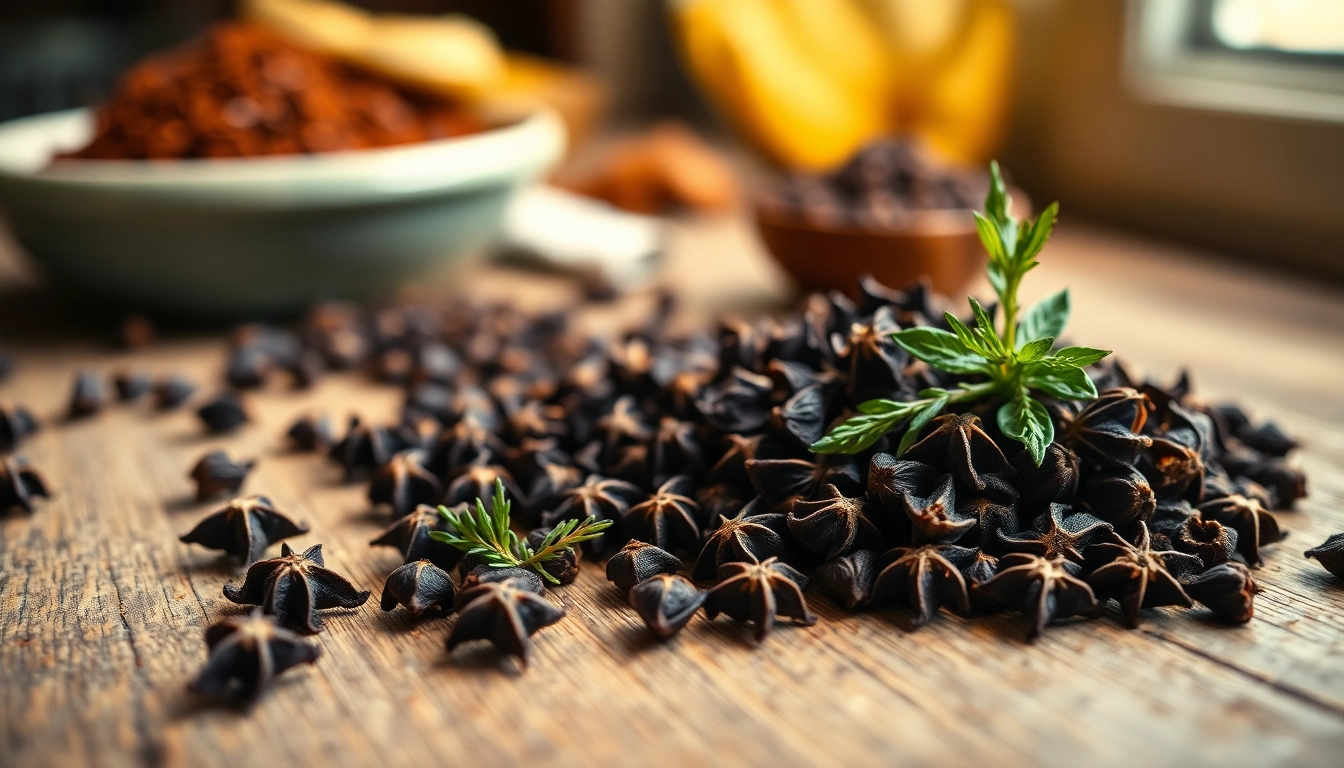What Are Cloves? Understanding Their Origins and Characteristics
The Botanical Background of Cloves
Cloves are the aromatic flower buds of the Syzygium aromaticum tree, part of the Myrtaceae family. Native to the Maluku Islands in Indonesia, these buds are harvested before they bloom, revealing their full flavor potential. From their vibrant history as a highly sought-after commodity in international trade to their cultivation in tropical regions around the globe, cloves have earned their place not just in kitchens but also in apothecaries.
Flavor Profile and Aroma of Cloves
The flavor of cloves is intense, warm, and piquant, often characterized by a sweet, slightly bitter profile with notes reminiscent of nutmeg and allspice. The aroma is equally compelling; it contains a spicy, warming scent that can elevate any dish. This combination of flavors and fragrances makes cloves a vital ingredient in various cuisines, particularly in Indian, Middle Eastern, and European cooking.
Various Forms of Cloves: Whole, Ground, and Oil
Cloves can be found in several forms, including whole buds, ground cloves, and clove oil. Whole cloves are delightfully aromatic and ideal for long infusions in stews, while ground cloves offer a concentrated flavor perfect for baking. Clove oil, extracted from the buds, carries the potent essence of cloves and is frequently used in traditional medicine, aromatherapy, and even as an ingredient in cosmetics. It’s crucial to choose the form that best suits your intended application.
Health Benefits of Cloves: Nature’s Powerful Spice
Nutritional Content and Antioxidant Properties
Rich in nutrients, cloves are a powerhouse of vitamins and minerals. They contain manganese, vitamin C, and certain essential oils, notably eugenol, which has potent antioxidant properties. Antioxidants help to combat oxidative stress, reducing the risk of chronic diseases.
Cloves as Natural Remedies: Traditional Uses
Traditionally, cloves have been used for their healing properties. They were often employed to alleviate toothaches, soothe digestive ailments, and enhance overall immunity. In many cultures, clove tea is regarded as a natural remedy for respiratory issues, packing significant health benefits derived from this aromatic spice.
Scientific Research Supporting Health Benefits
Recent studies validate many of the traditional uses of cloves. Research has demonstrated that clove extracts may possess antibacterial properties, supporting oral health by inhibiting the growth of harmful bacteria. Furthermore, studies indicate that eugenol can aid in managing blood sugar levels and reducing inflammation, solidifying the perception of cloves as a functional food.
Cloves in Culinary Applications: Enhancing Your Dishes
Classic Recipes Featuring Cloves
Cloves are an essential component in a variety of classic recipes. They are frequently used in mulled wines, chai teas, and spiced desserts like gingerbread cookies and pumpkin pie. The rich warmth of cloves complements meats beautifully, making them a staple in roasted dishes, especially in holiday cooking.
Innovative Ways to Use Cloves in Cooking
In addition to traditional uses, cloves can be innovatively employed in modern culinary practices. For instance, infusing oils with cloves adds a unique depth to salad dressings. Clove-infused cream can create an unexpected yet delightful dimension to desserts like panna cotta. Furthermore, including cloves in spice blends can enhance marinades for meats or even elevate vegetable dishes.
Pairing Cloves with Other Ingredients
Cloves pair wonderfully with a variety of ingredients. Their warm undertones complement sweet elements like apples, peaches, and caramel while balancing savory profiles in dishes featuring ginger, cinnamon, and various citrus fruits. Hence, it’s not only the clove’s singular potency that counts but how well it merges with other flavors to create complex and delightful dishes.
Buying and Storing Cloves: Tips for Quality and Freshness
Choosing High-Quality Cloves
When selecting cloves, quality should be a primary consideration. Look for whole cloves that are plump and have a deep brown color, which indicates freshness. If purchasing ground cloves, ensure they are from reputable brands and preferably organic, as they retain more flavor and aroma compared to mass-produced alternatives. A trusted resource for high-quality products is Cloves from specialized spice vendors.
Storage Solutions to Maintain Freshness
To preserve the potency of cloves, store them in an airtight container in a cool, dark place. Avoid exposure to light and moisture to maximize their shelf life, which can be up to three years for whole cloves and one year for ground cloves. Regularly check for signs of fading scent or flavor to assess their usability.
Common Mistakes in Clove Usage
While cloves can enhance many dishes, overuse can lead to an overpowering flavor. A common pitfall is adding too many cloves to a recipe, which can mask the subtleties of other ingredients. It’s also essential to consider the cooking time; adding cloves too early in cooking may make their flavor too dominant. Instead, consider adding them towards the end for a more balanced infusion.
The Environmental Impact and Sustainability of Clove Production
Ethical Sourcing of Cloves
As the demand for cloves continues to grow, ethical sourcing becomes increasingly important. Engaging with suppliers who prioritize sustainable farming practices ensures that the impact on the environment is minimized. Many producers are adopting agroforestry methods, promoting biodiversity, and preserving ecosystems while harvesting cloves, making them a more responsible choice for consumers.
Impact of Clove Farming on Ecosystems
Clove farming, when practiced sustainably, can benefit ecosystems, supporting local fauna and maintaining soil health. However, unsustainable practices can lead to deforestation and depletion of local resources. It is crucial for consumers to support brands and suppliers that adhere to ethical standards and promote sustainable agriculture to help mitigate these negative impacts.
Future of Sustainable Clove Production
Looking ahead, the future of clove production will likely focus on organic cultivation methods, sustainable agriculture practices, and equitable trade. Increased consumer awareness regarding sustainability will drive the market towards eco-friendly sources of cloves, paving the way for innovative farming practices that ensure the longevity of this precious spice and its ecological benefits.
